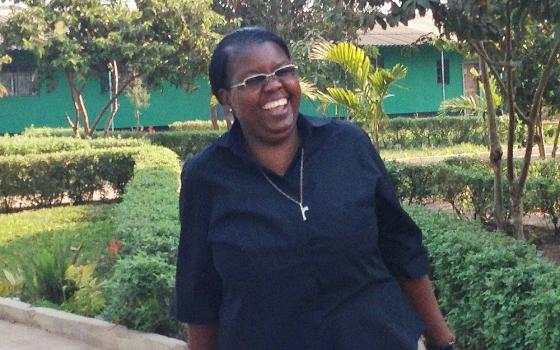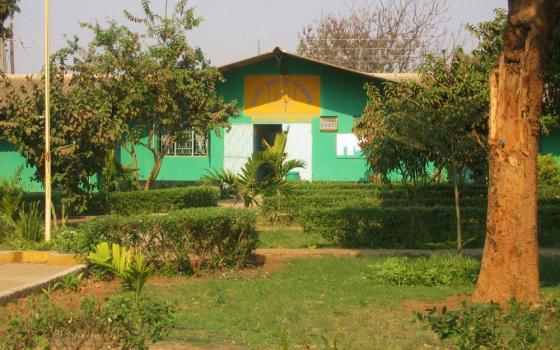Sr. Loice Kashangura walked the dusty streets of Chipata Compound like a neighbor.
Friendly. Approachable. Perfectly at home. And as Kashangura gestured and smiled, neighbors called out greetings to the Franciscan sister who helped get them a secondary school.
Chipata Compound is a sprawling, densely populated area just outside Lusaka, Zambia, with low-slung stalls and storefronts and small, crowded-together houses. St. Paul’s School, its first building painted green and fronted by a leafy courtyard, seems like an oasis.
And its expansion is definitely a feat.
“I came here thinking I going to teach full-time in the philosophical college [St. Bonaventure University College],” Kashangura explained, “only to realize there was a bigger job waiting for me –this school. At that time it was just a primary school, that green structure. The secondary school didn’t exist.”
Kashangura is school manager of St. Paul’s, which serves more than 1,000 students in upper and lower schools, each led by a headmaster. A Franciscan Missionary Sisters for Africa from Zimbabwe, she studied theology and anthropology in Ireland and then came to Lusaka.
That was in 2009. This month, when school reopened after more construction, teachers had a gathering room, students had a new library and the first class of 12th graders began their final year at St. Paul’s.
As school manager you have many responsibilities, from development and construction to supporting staff and teachers –
When they feed into me the needs it’s always, ‘Sister, we need this, Sister we need that.’ Then I am responsible for applying for funds. Sometimes when I don’t get funds I tell the sisters, ‘I am stuck. I don’t know what to do.’ One person may help – a little bit of help here . . . a little here.
So I rely very much on my congregation; I rely very much also on the donors. I have good relationships with three organizations that are interested in construction. That’s why the construction of the school became a reality. It is much, much bigger than our expectations.
You also teach?
I still teach in the philosophical college, one day a week, for the morning, until lunch. I like teaching there because it keeps me a bit away from here.
When I am here it’s like, ‘Sister solves problems.’ I am not, I am not that able! But with the support of the team, the administrators, I’ve seen that I am growing more and more into what I thought I wasn’t.
So it’s a quite good [environment] in the school. And a lot has happened since I came: the completion of the science labs; he beginning of the secondary school . . . .
Why was a secondary school added?
The parents came when I was only two weeks in the school – just two weeks working there. The parents came and said: ‘Our children are walking very far.’ It is true, some of them [spend] more than two hours walking to schools, very far. There was no secondary school here.
So we looked at it; how do I answer this? I talked to my superior general, the congregational leader in Ireland, and she said, ‘OK, do an application. I will submit it in somewhere.’
There is a Franciscan organization, it was the first. They gave us $25,000. Then we got another $20,000. Every money that we get, we put it [in the school], rather than keep it until we have enough. We just use it!
So we started building the first block, six classrooms. The moment we finished, we took children. Yes, we took children and the first group that came in 2011 is now the one in grade 12, that’s the examination class.
That’s a lot.
So it’s wonderful to be able to serve in this community. And you can see the appreciation from parents. They really appreciate, and now they contribute more, because they can see where their money is going.
And they say during meetings, we will contribute, we will try – they really try – because, ‘We know Sister puts the money to good use.’ Which is a very encouraging thing for me, to have parents behind me.
And some of them just come and say, ‘Sister, I will pray for you.’ Yes! For me, that is big. The challenges are many, but there is something very, very fulfilling.
It is wonderful to be working here, but I feel that, as a Franciscan, this where we are called to be, serving the marginalized community. And also our witness is in living among them. People don’t believe –‘Where do you live?’ ‘Chipata Compound.’ We live here. This is our home.
Chipata Compound is considered a slum?
It is a slum, it is. I don’t know which way you came, but you see the roads. There are no roads through and the type of toilets and . . . whatever. It’s a big slum.
And some people are starting to come back for the school?
Yes, there are children who were here when we were starting – we still only had one [school] block – and they were still walking long distances. Now they come back looking for places. ‘We want to come back,’ [students say]. ‘Why?’ ‘Oh, because the school is nice.’
Yes. The school is nice. Our problem now is to limit the number of children coming in, because of the space. We have to think ahead. The government is going to require that all grades eight and nine move permanently from primary school and into the secondary school because the government is [changing] its basic education school from grades one to nine to grades one to seven. So we have to think ahead.
How is the school expansion making a difference for people in Chipata Compound?
They have seen the beautiful buildings, an attraction for everyone. For us, we did it because we didn’t have enough space, but it has become something else. It has really lifted, for me, not only the standards of the school, but also the standards of the compound, because this is where the school is. The compound has become an attraction even for people who have children staying with cousins, uncles, in another nice, posh place. Because the school is good.
[Mary Lou Nolan is managing editor of Global Sisters Report. She traveled to Zambia in August for the ACWECA meeting to meet sisters working in Africa.]


